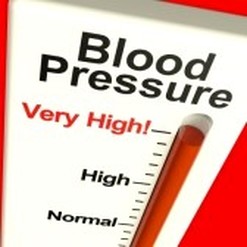About High Blood Pressure And Problems It Causes

Blood pressure is the measure of blood's force against the arteries and when you get your blood pressure checked, the doctor looks at the systolic pressure and diastolic pressure. Systolic pressure is the force that happens while the heart beats while diastolic pressure is the force that happens during the heart's relaxation. High blood pressure takes place when a person's blood pressure increases to the point where it interferes with the heart's health. When you have high blood pressure your heart works harder than average and this could cause a heart attack or stroke if not treated.
The Role That Excess Salt Plays in High Blood Pressure
Your body needs sodium to function properly but the problem is when some people eat salt and other high sodium foods in excess. Your kidneys start to malfunction over time due to excess salt intake, and as a result the salt overpowers your bloodstream. The excess salt in your bloodstream turns to water and when this water increases in the bloodstream, you get high blood pressure. This is why you need to cut back on high sodium foods and look for flavoring substitutes for salt when cooking if you have a history of high blood pressure.
Fiber Rich Foods Lower Blood Pressure
Now that you're eating less sodium-rich foods on a regular basis, substitute these foods with fiber-rich foods since they have been shown to lower and even prevent high blood pressure. Some good fiber rich foods include whole grain breads, brown rice, berries, beans and peas and other plant based foods. Leafy greens are also high in fiber but when you cook them, leave out the salt pork and use shredded chicken instead.
Handle Stress Better
One reason why some people develop high blood pressure is because of stress. You can relieve stress by not worrying about things that are unimportant, praying and talking with loved ones, taking long naps, reading inspirational books and not overextending yourself when others ask you to help them. If necessary, seek counseling to overcome stress.
Vitamin C And Benefits for Blood Pressure
According to a study from Johns Hopkins University, vitamin C can help in lowering blood pressure. The researchers conducted a study that included over 1400 people and when the study concluded that vitamin C is good for blood pressure because it maintains healthy levels of nitric oxide in the body, which is beneficial for regulating blood pressure.
Conclusion
High blood pressure is a devastating condition but you don't have to live with it permanently because when you use the above mentioned steps, you are on your way to being a healthier person. You should also visit the doctor regularly and maintain a healthy weight through diet and exercise.
The Role That Excess Salt Plays in High Blood Pressure
Your body needs sodium to function properly but the problem is when some people eat salt and other high sodium foods in excess. Your kidneys start to malfunction over time due to excess salt intake, and as a result the salt overpowers your bloodstream. The excess salt in your bloodstream turns to water and when this water increases in the bloodstream, you get high blood pressure. This is why you need to cut back on high sodium foods and look for flavoring substitutes for salt when cooking if you have a history of high blood pressure.
Fiber Rich Foods Lower Blood Pressure
Now that you're eating less sodium-rich foods on a regular basis, substitute these foods with fiber-rich foods since they have been shown to lower and even prevent high blood pressure. Some good fiber rich foods include whole grain breads, brown rice, berries, beans and peas and other plant based foods. Leafy greens are also high in fiber but when you cook them, leave out the salt pork and use shredded chicken instead.
Handle Stress Better
One reason why some people develop high blood pressure is because of stress. You can relieve stress by not worrying about things that are unimportant, praying and talking with loved ones, taking long naps, reading inspirational books and not overextending yourself when others ask you to help them. If necessary, seek counseling to overcome stress.
Vitamin C And Benefits for Blood Pressure
According to a study from Johns Hopkins University, vitamin C can help in lowering blood pressure. The researchers conducted a study that included over 1400 people and when the study concluded that vitamin C is good for blood pressure because it maintains healthy levels of nitric oxide in the body, which is beneficial for regulating blood pressure.
Conclusion
High blood pressure is a devastating condition but you don't have to live with it permanently because when you use the above mentioned steps, you are on your way to being a healthier person. You should also visit the doctor regularly and maintain a healthy weight through diet and exercise.
